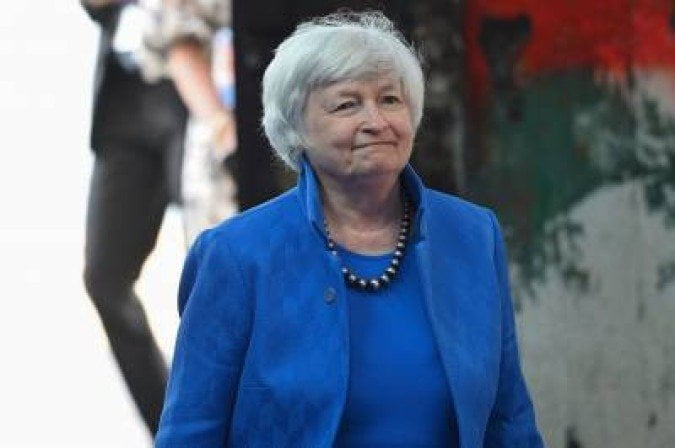Posted on 4/20/2022 6:12 PM / updated on 4/20/2022 6:51 PM

(Credit: ANDREAS SOLARO/AFP)
The meeting took place behind closed doors, parallel to the annual spring (Northern Hemisphere) meeting of the International Monetary Fund (IMF) and the World Bank in Washington, USA, but during the meeting Russia provoked a new G20 ministerial rebellion, a group representing the 19 largest Industrialized and emerging countries as well as the European Union united. The meeting this Wednesday (4/20) led to a protest against Russia, which Brazil did not attend.
Led by US Treasury Secretary Janet Yellen, finance ministers and central bank governors from European and Western countries walked out of the G20 meeting in protest at the war in Ukraine, as the Russian representative launched an intervention that impacted international authorities. Yellen got up and left the room after a Russian representative began speaking.
However, the Brazilian representatives, Economy Minister Paulo Guedes and Central Bank President Roberto Campos Neto, remained at the meeting and completed their agendas, according to their respective advisers. The two are in Washington to attend IMF and World Bank ministerial meetings.
“The world’s democracies will not stand idly by in the face of ongoing Russian aggression and war crimes. Today, Canada and several of our democratic partners walked out of the G20 plenum as Russia attempted to intervene,” Canadian Finance Minister Chrystia Freeland wrote on her Twitter profile.
Freeland released a photo of officials leaving the meeting, including Yellen, Federal Reserve Chair Jerome Powell and European Central Bank President Christine Lagarde.
The world’s democracies will not stand by in the face of continued Russian aggression and war crimes. Today, Canada and a number of our democratic partners walked out of the G20 plenary as Russia sought to intervene. pic.twitter.com/J67gU810sO
— Chrystia Freeland (@cafreeland) April 20, 2022
Ahead of the ministerial meeting, US officials said Yellen would not attend certain sessions of the meeting attended by Russia, CNN’s website reported. The American TV channel also stressed that the withdrawal of the authorities took place precisely at the moment when Russian Finance Minister Anton Siluanov began speaking virtually at the G20 meeting.
Although US President Joe Biden has said Russia should no longer be a member of the G20, expelling Moscow would require the support of all members. This is considered unlikely as China has said it will not support Russia’s expulsion.
Yesterday, in a virtual presentation by thinktank CSIS, Economy Minister Paulo Guedes said that Brazil is opposed to Russia’s exclusion from the IMF, also stating that despite condemning Russia’s invasion of Ukraine, the Brazilian government is opposed to imposing sanctions on Moscow.
revised forecasts
Multilateral bodies have revised downwards global growth forecasts for this year. The IMF, for example, has lowered its forecast for global gross domestic product (GDP) growth this year to 3.6% from 4.4%, citing the war in Ukraine and new lockdowns in China due to Covid19 is.
On the other hand, the fund raised its forecast for Brazil’s GDP growth this year to 0.5% from 0.3% this year, mainly due to improving prospects for commodity exports as Brazil is a major food producer and prices have plummeted due to the war in Ukraine shot up .
Silvio Campos Neto, partner at Tendências, recalled that despite the improvement in IMF forecasts, Brazil continues to grow less than the world. He noted that downward revisions to global GDP growth in major economies such as the United States and China are relevant and set off a red flag that the fund may lower its estimates further.
“The fund cut its GDP growth forecast to 4.4% from 4.8%, a rate well below the Chinese government’s 5.5% growth target, leaving the context for the Chinese economy and the global economy very difficult ‘ he warned. “The risk of a slowdown in China is greater and nearterm inflation could continue to weigh on expectations. Because of that, there are a number of reasons for the world to be more cautious,” Campos Neto added.
For Alex Agostini, chief economist at Austin Rating, Brazil will continue to grow little because it cannot make the necessary adjustments to rebalance public accounts. “Brazil grows little and in crises like the current one it increases because it doesn’t do its homework,” he said, recalling that the fiscal consolidation outlined by the economic team is just talk and does not correspond to reality.
“Inflation and extraordinary revenues, mainly resulting from the increase in oil prices, have helped the government to adjust only on the revenue side and not on the expenditure side,” he lamented.

